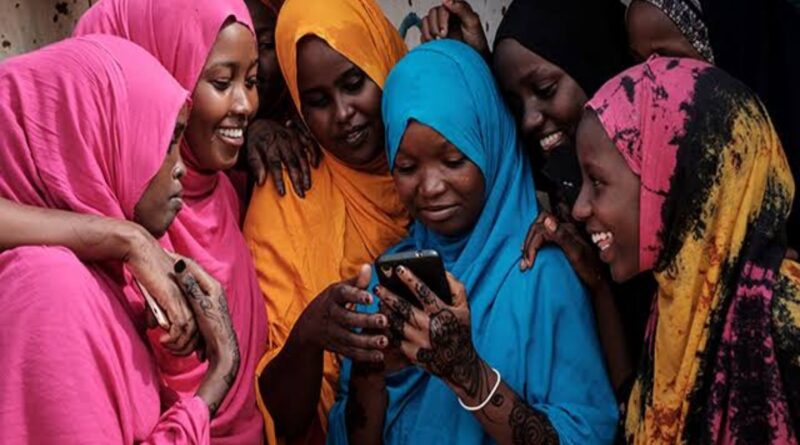iGen: The Generation in the University for a Certificate and not an Education.
By Abdelghaffar Amoka Abdelmalik, PhD
If you belong to GenX (birth date from 1965 – 1979) and have got issues with the Millennials (birth date from 1980 -1994), wait till you critically have a close look at iGen, a generation where excessive parental love is becoming a problem.
iGen is the generation born between 1995 and 2012, so they are the first generation to spend their entire adolescence with a smartphone.
According to Dr. Jean M. Twenge, the author of “iGen: Why Today’s Super-Connected Kids Are Growing Up Less Rebellious, More Tolerant, Less Happy — and Completely Unprepared for Adulthood — and What That Means for the Rest of Us”, iGeners are born into a more individualistic culture and less independent due to their slow and protected upbringing and arrives at college with less experience with adult situations.

From children’s growth and development stages, a three- to four-year-old is always moving, always imagining, always asking why, while a five-year-old may start to sit and listen for longer stretches. GenX was lucky to have had the opportunity to enjoy that.
At the age of 3 to 5 years, we played with our peers within the neighborhood without any fear of kidnapping. We were not forced to sit in a classroom to learn things we do not need at that age. We learn the basics of life in a free environment from our parents and within the neighborhood.
Is it OK to say that I am glad to be part of GenX, a generation characterized by an independent mind, flexibility, critical thinkers, and self-reliant? GenX appears to be the last generation that had the opportunity for a proper childhood.
About 30 years ago in public primary schools, we were in school from 8 am till 1 pm, then an hour to get home for lunch and proceed to Quranic class from 2 pm till 4 pm. Then get back to the school field for games from 4 pm to 6 pm on Tuesdays and Thursdays.
I used to spend my holidays making baskets and chicken cages from palm fronts and going to the farm. Making money as a young boy from making baskets and the chicken cages was fun. Also in public secondary schools, academic work was from 8 am till 2 pm and prep from 3 pm till 4 pm and games, society meetings, quiz, and debate, etc., from 4 pm till 6 pm.
I participated in quizzes and even as a science student, I was a Press Club member and a Newscaster on the assembly ground. I still utilized my holidays to work on our farm and make baskets and chicken cages to make holiday money. I am sure quite a number of us within my age had similar experiences and eventually got to the university and we are where we are today.
With the collapse of public schools, everything changed. Private schools are now a booming business ventures. Kids start school at the age of 2 years when they are meant to be with their families moving around, imagining stuff, and always asking why.
They are taught what they don’t need at that age. The school proprietors/proprietress understand that parents want to keep their kids away from them by keeping them in school all year round and they are utilizing the opportunity to make more money at the expense of their mental development.
In the words of Kerry McDonald, a Senior Education Fellow at FEE and author of Unschooled: Raising Curious, Well-Educated Children Outside the Conventional Classroom; “Every parent knows the difference a year makes in the development and maturity of a young child. A one-year-old is barely walking while a two-year-old gleefully sprints away from you. A four-year-old is always moving, always imagining, always asking why, while a five-year-old may start to sit and listen for longer stretches”.
At two years old when they gleefully sprint away from you to four years old when they are always moving, always imagining, and always asking why, we CONFINED them within the 4 walls of a classroom to learn states and capitals and write and identify letters. Children haven’t changed, but our expectations of their behaviour have.
We increasingly expect them to learn academic content at an early age that may be well above their developmental capability. You can see that from loads of homework given to these kids each day. Parents even expect their children to read in kindergarten and to become proficient readers soon after.
Meanwhile, during the beginning of the first term of this academic session, I went to get the books for my child in primary one. The books are customized for the school and class and can’t be used by another child, unlike our generation that transfers books to younger ones. I flipped through the books and I wonder what a primary one pupil needs such a number of books for.
It was obvious that the schools are just helping publishers sell their books. They should know that these kids that should ordinarily be playing can’t study such a number of books. Verbal and quantitative reasoning in nursery and primary one classes? They are utilizing the time they are supposed to use to play to study Verbal and quantitative reasoning.
I still wonder if the private school curriculum and their books are vetted by the Ministry. The kids at the age of 2 – 4years even do after-school lessons. Meanwhile, research shows that pushing early literacy can do more harm than good.
Education professor Nancy Carlsson-Paige and her colleagues in their report, Reading in Kindergarten: Little to Gain and Much to Lose, stated that when children have educational experiences that are not geared to their developmental level or in tune with their learning needs and cultures, it can cause them great harm, including feelings of inadequacy, anxiety, and confusion.
The question then is; can this early push make them better than they would have been? Can enrolling kids in school at the age they are meant to be playing produce a genius out of them? It doesn’t seem so as after these all year-round schooling, the parents will still have to pay for the child to cheat to pass qualifying exams.
It is definitely not a surprise that after placing these young children in artificial learning environments, separated from their family for long lengths of time, and expecting them to comply with a standardized, test-driven curriculum, it becomes too much for many of them and we have to help them to cheat to pass exams.
These kids come to the university and you wonder what they did for their 12 years in primary and secondary schools. Even though they started school at the age of two, only very few are coping well academically in the university. They have low self-esteem, lack initiative, and can’t think.
This may be attributed to the fact that during their childhood we distorted their mental development by confining them within the 4 walls of a classroom to learn what they don’t need at a stage when they are supposed to be always moving, always imagining, and always asking why. And ASUU is blamed for graduating students without initiative and cannot think.
The Ministry of Education is saddled with the responsibility of monitoring and the supervision of our school system. Does it mean that the ministry is not aware of the mess in our education system and the need to shape the system, or corruption has eaten up their monitoring and supervisory role?
We have seen over the years as children are going to school at younger and younger ages, and are spending more time in school than ever before. Asking parents who are happy to keep their kids in school all day to delay in enrolling their kids in school is practically impossible.
But can our government develop an education policy on the “birth-to-five system of early care and education,” for early childhood learning and development? Not very likely. They are busy with their elitist ideas and have left the education of the people in the hands of school business men and women.
The government at all levels seems to have no education policy towards the development of the iGeners and the generations to follow.
They seem to be only interested in taking levies from private school owners (IGR), establishing more universities as political achievements without a funding plan, and introducing tuition fees as recently unveiled by a State Governor. You definitely didn’t expect a Northern State Governor to champion the privatization of public schools.
As schooling becomes more rigid and consumes more of childhood, it is causing increasing harm to children. Many of them are unable to meet the unrealistic academic and behavioural expectations at such a young age. Parents should push back against this alarming trend by holding onto their kids longer or opting out of forced schooling altogether
We need to find a way to help ourselves and the iGeners towards better education since the government seems to have got no plan for us. The people that designed the school program to be from 8 am till 2 pm, Monday through Friday know that that time is just enough to learn what they need to learn.
The school was fun for most of us with extracurricular activities. It is very unfair if we deny our kids from growing up and learning other things aside from book book book. There are several ways to spend holidays and after-school hours. Summer camps, acquiring extra skills such as tailoring, knitting, art, craft, baking, etc, and of course play, play and play.
My wife, for example, organized “Art and Craft Summer Class” sometime back and I was there and watched the kids having fun with the beautiful art piece they produced from their imagination. There is so much for kids to learn outside the 4 walls of a classroom.
Don’t let your eagerness to see your kid in the University becloud your sense of reasoning. You are killing your child’s attitude towards learning, initiative, intelligence, creativity by helping him/her cheat in examinations to have a great result that he/she cannot defend. You are endangering his/her future.
A good home is surely essential to a proper upbringing. The challenge is how do we insulate our kids from the negative environmental influence? Children like budding plants, need to be protected from the harmful environment (friends, media, books, etc).
It’s unhealthy to let the kids be on their own to be pulled in various directions in the name of “career building and economic empowerment” with the fallacious hope that they will sort out themselves naturally. Let children enjoy that privilege of being a child. They need it for their mental development.
As Dr. Jean Twenge stated, an iGener is more likely than previous generations to go to college to get a good job and less likely to go to get an “education”. Although we have to bring students around to the idea of the importance of education for its own sake, we also have to keep their practical goals in mind when reaching out to them and teaching them.
iGen brings unique experiences to the classroom. As just one example, they have spent much more time online and much less time reading books than previous generations. That alone means we have to think about teaching them differently.
Be a good parent. Train your kid well and give him/her the right education. FAST FORWARDING the education of your kids may not be in their best interest.
Abdelghaffar Amoka Abdelmalik, PhD. Writes from the Department of Physics, Ahmadu Bello University, Zaria.
For Advert Placement, Sponsorship, support, Article submission, suggestion, etc, Contact us: info@theabusites.com, +2349015751816 (WhatsApp)








